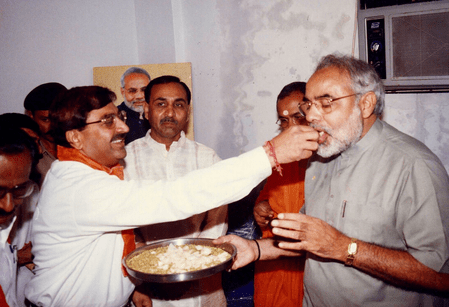
The tragic Air India plane crash in Ahmedabad has claimed the life of former Gujarat Chief Minister Vijay Rupani, sending shockwaves through the political circles of India.
Rupani, who began his political journey as a corporator in the Rajkot Municipal Corporation in 1987, steadily rose through the ranks, serving as Mayor, Rajya Sabha MP, Gujarat BJP President, and Cabinet Minister before becoming Chief Minister in 2016.
Throughout this ascent, he remained a trusted colleague of Prime Minister Narendra Modi, known for his quiet diligence and commitment to the party’s ideology.
In the quiet stillness of grief, a series of photographs now speak louder than words. Images from the X handle of “Modi Archives” capture the enduring friendship between Prime Minister Narendra Modi and the late Vijay Rupani — moments that now feel like fragments of a shared journey frozen in time.
A glance at the photographs from the Modi Archives tells a story no speech could capture. They trace a bond that went beyond politics. Two men who once stood shoulder to shoulder, not only in the glare of public life, but in the quiet, defining moments of Gujarat’s political journey.
There is a frame from the late 1990s in Rajkot, where a younger Narendra Modi, not yet the national leader he would become, stands beside Vijay Rupani at a party event.
Their expressions are earnest, the setting humble, yet the shared purpose is unmistakable.
Another photograph captures the warmth of trust as PM Modi, during Rupani’s swearing-in as Chief Minister in 2016, rests a hand on his shoulder.
The gesture, though simple, radiates deep familiarity — born of decades of shared ideology, struggle, and discipline within the BJP’s ranks. One poignant image shows the two walking together at a Vibrant Gujarat Summit.
Modi, then Prime Minister, walks slightly ahead, but it’s Rupani who matches pace without hesitation. It’s a subtle symbol of leadership passed forward, not just endorsed but nurtured.
One such image shows PM Modi, then Gujarat’s Chief Minister, standing beside Rupani at a BJP event in Rajkot.
Both men are smiling — not for the cameras, but in the quiet confidence of shared purpose. Another frame, taken during Rupani’s swearing-in ceremony in 2016, shows PM Modi placing a hand on his shoulder, a gesture that conveyed trust, mentorship, and a bond forged in the crucible of Gujarat’s political evolution.
There is a photograph from the Vibrant Gujarat Summit, where Rupani, as Chief Minister, walks alongside PM Modi, flanked by global dignitaries.
The image reflects not just protocol, but a partnership — one that helped shape Gujarat’s economic narrative. In another, more candid moment, the two are seen in conversation at the Sabarmati Ashram, their expressions thoughtful, as if reflecting on the ideals that brought them into public life.
These are not the rehearsed photos of political ritual, but living documents of a friendship forged long before the national spotlight arrived.
In one of the most endearing images from their long political journey, Vijay Rupani is seen gently offering sweets to Prime Minister Narendra Modi — a moment that captures not just celebration, but deep personal warmth.
The occasion, likely following an electoral victory or a significant party milestone, shows PM Modi smiling with the ease of someone among trusted companions.
Rupani’s gesture is affectionate, almost familial, and PM Modi’s expression reflects a bond that transcends protocol.
Another photograph on the Modi Archives, more formal yet equally telling, shows the two leaders sharing a dais at a press conference.
PM Modi, then the towering national figure, and Rupani, the Chief Minister of Gujarat, sit side by side — aligned in message and mission.
The backdrop bears the party’s insignia, but the real story lies in their body language: attentive, composed, and in sync.
Rupani listens as PM Modi, then Chief Minister of Gujarat, addresses the media, his posture deferential yet assured.
It’s a portrait of political partnership — one forged in Gujarat’s transformation and carried forward into national relevance.
When PM Modi visited Rupani’s family following the Air India crash, the grief on his face was not political — it was personal.
“We worked together during some of the most challenging times,” he wrote, and the archive’s images bear witness to that truth.
Their story was not one of headline moments alone — it was built in grassroots campaigns, in ‘non-glamorous’ organisational roles, in the resolve to elevate Gujarat and, later, to serve the nation. These images now carry the weight of memory.
When Prime Minister Modi visited Rupani’s family after the Air India crash, his words on X echoed the emotion etched in those photographs: “We worked together, shoulder to shoulder, including during some of the most challenging times.” It was not just a political alliance – it was kinship.











